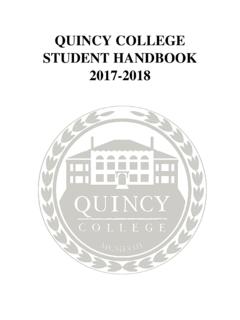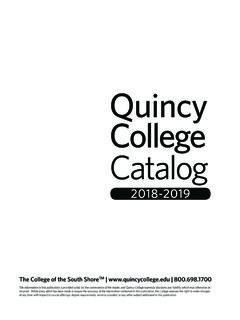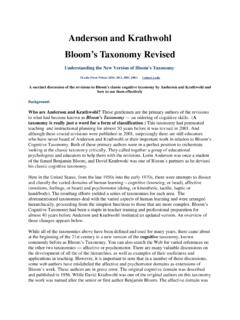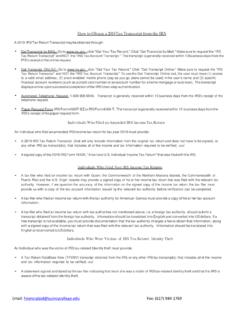Transcription of Student Handbook 2017-2018 - Quincy College
1 Quincy College Division of Natural & Health Sciences Medical Laboratory Technician Program Student Handbook 2017 - 2018 . Table of Contents Student Handbook Overview Statement .. 1. Program Accreditation .. 1. Quincy College Mission Statement .. 2. Medical Laboratory Technician Program Mission Statement .. 2. Program Description .. 2. Program Goals .. 3. Program Outcomes .. 3. Program Faculty .. 4. Essential Functions .. 4. Visual and Observation Skills .. 4. Motor and Mobility Skills .. 4. Communication Skills .. 4. Behavioral Skills .. 4. Certification Eligibility .. 5. Pre-Requisite Classes before Admissions to the MLT program .. 5. Application .. 6. Admission Process .. 6. Health Forms.
2 6. CORI Check .. 7. Course Registration .. 7. Biohazard Safety Policy .. 8. Medical Laboratory Technician Program Curriculum .. 9. MLT Course Descriptions .. 9. Grievance Policy .. 14. Failure or Withdrawal of MLT Courses .. 14. Dismissal Policy .. 14. Verbal/Written Warnings .. 14. Confidentiality Guidelines .. 15. Dress Code Policy .. 15. Attendance Policy .. 16. Cell Phone/Pager Policy .. 16. Behavior Policy .. 17. General Grading Policy .. 17. Services for students with a Disability .. 18. Clinical Practicum .. 18. General Information .. 18. Eligibility for Clinical Practicum .. 18. Rotation Assignments .. 18. Service Work Performed by students .. 20. Clinical Attendance .. 20. Removal of students from the Clinical Practicum.
3 22. Student Handbook Agreement ..26. Employment Reference 28. Quincy College MEDICAL LABORATORY TECHNICIAN PROGRAM. Student Handbook OVERVIEW STATEMENT. The Medical Laboratory Technician (MLT) Student Handbook is intended to provide students enrolled and potential students in the MLT program with basic information and policies used in the classroom, laboratories and the clinical setting. Please read the MLT Student Handbook carefully and ask the instructor for clarification of any policies or procedures that are unclear. The Medical Laboratory Technician Program reserves the right to make, alter or change any statement or policy without prior notice. students will receive revisions as they occur.
4 The Quincy College Catalog, website, and Student Handbook contain additional information on all services available at Quincy College (QC) and should be used by students to obtain full knowledge of all QC policies and procedures. The College reserves the right to alter or change any statement or policy without prior notice. students will receive revisions as they occur. All enrolled MLT students must read the entire MLT Student Handbook , sign the acknowledgment form and return it to the instructor. Quincy College . MEDICAL LABORATORY TECHNICIAN PROGRAM. Quincy College is accredited by the New England Association of Schools and Colleges, Inc., a non-governmental, nationally recognized organization whose affiliated institutions include elementary schools through collegiate institutions offering post-graduate instruction.
5 Quincy College Accreditation: New England Association of Schools and Colleges 209 Burlington Road Bedford, MA 01730. (781) 271-0022. Quincy College Medical Laboratory Technician Program is accredited by the National Accrediting Agency for Clinical Laboratory Science. National Accrediting Agency for Clinical Laboratory Science 5600 N. River Road Suite 720. Rosemont, IL 60018. (773) 714-8880. Program Chairman: Andrea McLain, MS, MT (ASCP). 1. Quincy College Mission Statement As an open access institution that encourages academic achievement and excellence, diversity economic opportunity, community involvement, and lifelong learning. The College facilitates valuable learning relationships that inspire students to realize their educational and professional futures.
6 MLT Program Mission Quincy College 's Medical Laboratory Technician Program provides a quality curriculum and innovative instruction to students who will, upon graduation, serve local, statewide, and national healthcare communities. Program Description The MLT program consists of didactic campus laboratory courses designed to progress the Student through a two-year program and provide them with entry-level knowledge and skills to perform clinical laboratory procedures. The MLT program curriculum includes courses in basic sciences, mathematics, social sciences, and the humanities, as well as the professional courses in chemistry, hematology, microbiology, immunohematology, immunology, parasitology, serology, urinalysis, and phlebotomy.
7 students spend the first three semesters in traditional classroom study on the Quincy College campus. As basic academic education progresses, more technical courses are added each semester. Technical courses offered on the College campus during these three semesters are taught in the Saville Building of campus in the laboratories. After that, students will have the opportunity to apply previously acquired knowledge and skills in a supervised working environment. Clinical laboratories at affiliate hospitals are utilized for the clinical experience. The practicum experience of the program is in the last semester and is 15 weeks duration. The time spent in the major laboratory departments provides the first major contact with the real world of laboratory work.
8 By the time the practicum begins, the Student has completed all didactic courses and Student laboratory training. To progress to the practicum, the Student must have completed all previous courses maintaining a "C" (73) average in each. students are assigned to clinical facilities or in-house clinicals for their practicum. The Student experiences at the affiliate hospitals are equivalent, guided by the same learning objectives, laboratory practical exams, and competency check-sheets at each laboratory. The purpose of the practicum is to focus on the application of principles and to broaden and refine clinical skills to the point of producing competent, productive employees. The clinical instructors give no formal lectures during the practicum.
9 A program instructor visits each clinical laboratory on a regular basis. The total time required to complete the degree requirements may be twenty-four (24) calendar months or longer. Placement depends on the availability of space in area clinical laboratories, which is often limited. Significant delays of up to twelve months may occur during this phase of training. 2. Upon completion of the program, students are eligible to sit for a national certification examination. The certification of choice for most employers is through the American Society of Clinical Pathology Board of Registry (ASCP). Massachusetts does not require a state license, though some states do. Completion of the MLT Program is not contingent upon passage of any external certification examination.
10 MLT Program Goals The goals of the Quincy College Medical Laboratory Technician Program are to: Provide students with the appropriate education and training to develop entry-level competencies in all routine areas of the clinical laboratory. Provide a quality program that reflects continuing assessment, evaluation, and revision. Provide a framework of education that reflects the mission and goals of QC. Be flexible and responsive to the needs of the clinical laboratory staff as they give input to the program. Prepare students for the MLT national certification examination, employment and further education. Provide a climate conducive to stimulating interest in MLT education and participating in professional organizations, and encouraging awareness in changing trends in Medical Laboratory Science.













